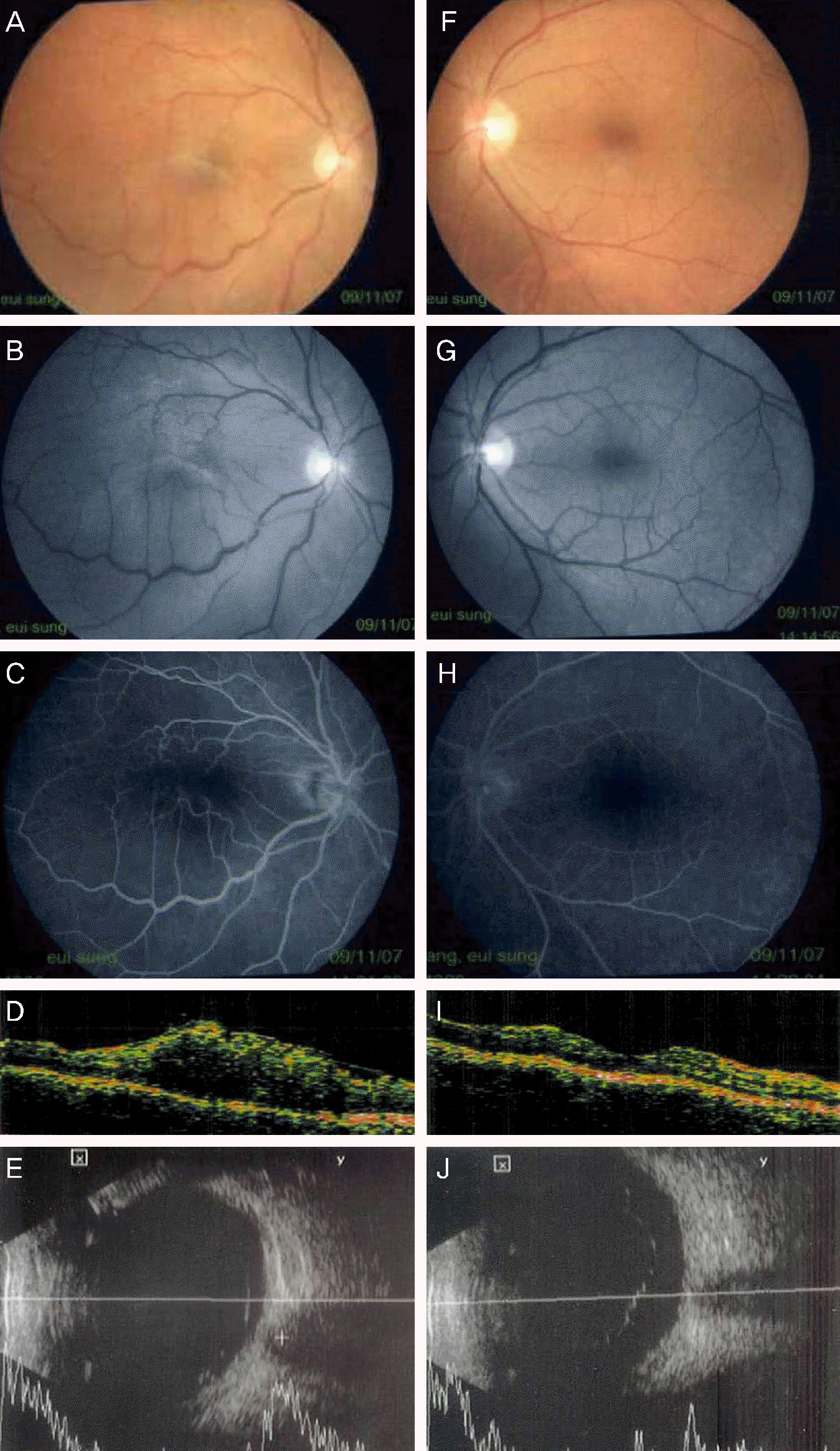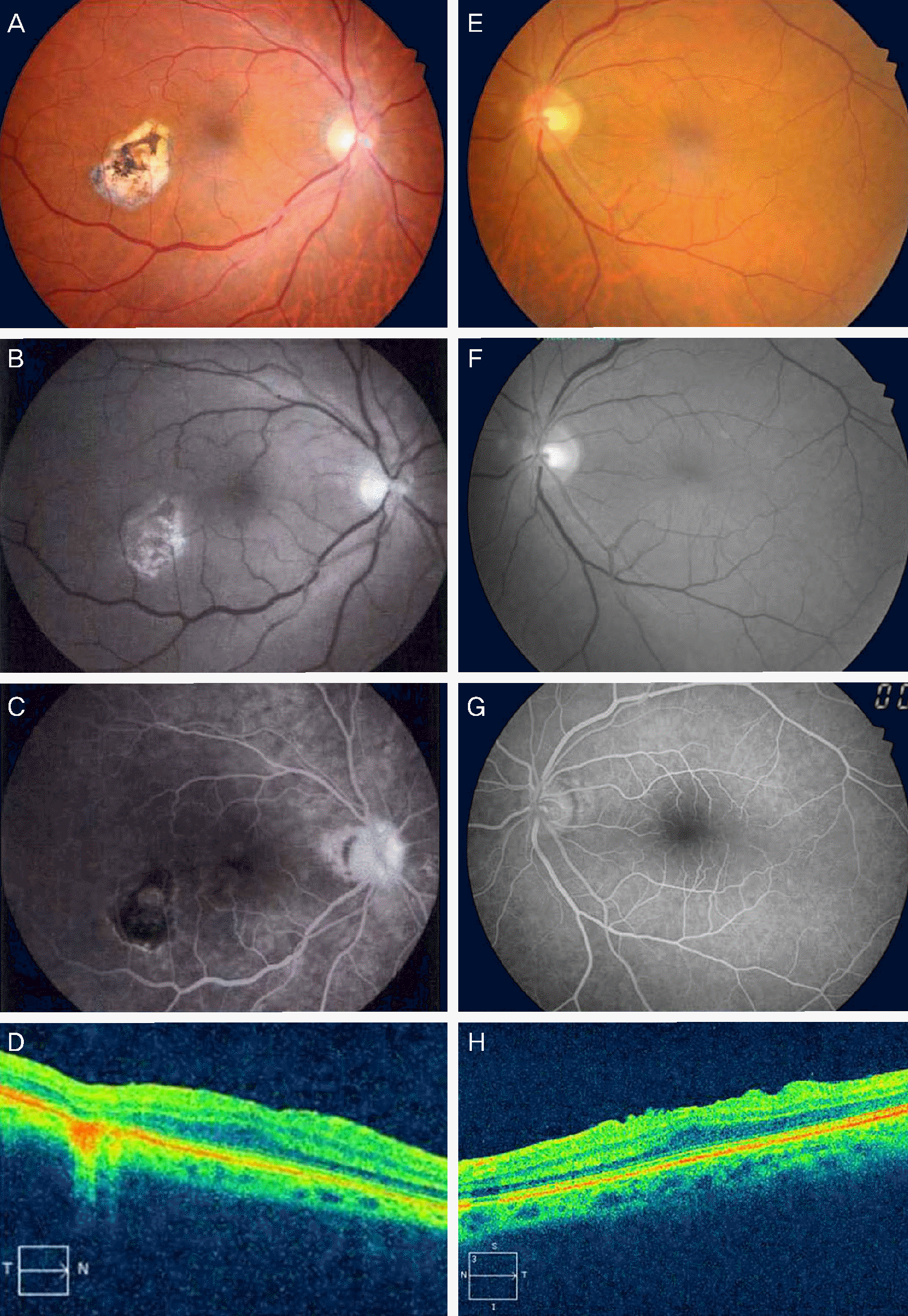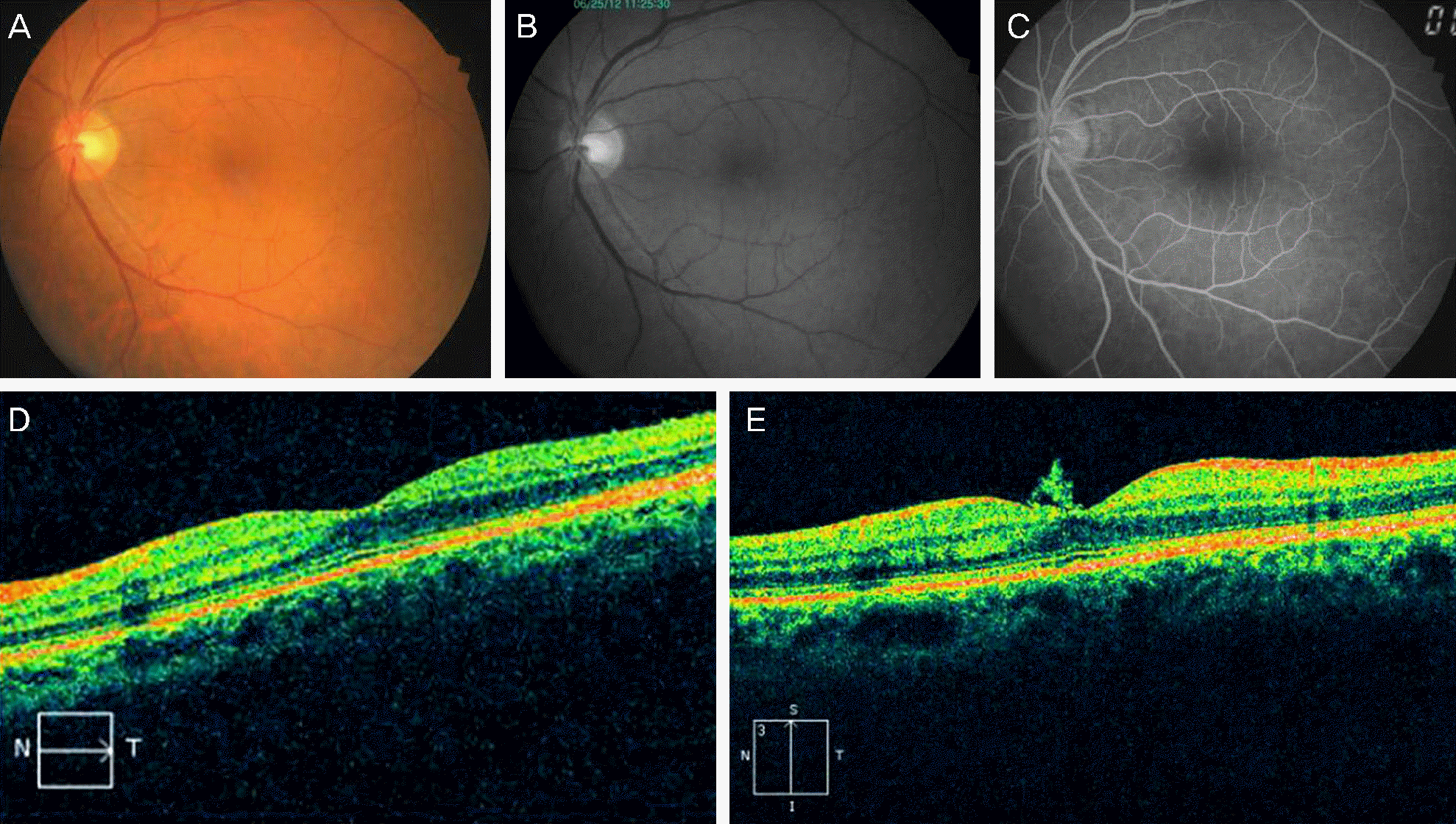Abstract
Purpose
To report a case of spontaneous separation of idiopathic epiretinal membrane in an elderly patient.
Case summary
A 61-year-old male presented with decreased visual acuity in the right eye. He was diagnosed with idiopathic epiretinal membrane (ERM) in the right eye and posterior vitreous detachment (PVD) in both eyes. The patient underwent pars plana vitrectomy and ERM removal in the right eye. At postoperative 1 year, his vision in the right eye had improved, but idiopathic ERM developed in the left eye and visual acuity in the left eye decreased. Three years later, the ERM in the left eye resolved spontaneously and his vision increased.
References
1. Appiah AP, Hirose T, Kado M. A review of 324 cases of idiopathic premacular gliosis. Am J Ophthalmol. 1988; 106:533–5.

2. Smiddy WE, Michels RG, Gilbert HD, Green WR. Clinicopathologic study of idiopathic macular pucker in children and young adults. Retina. 1992; 12:232–6.

3. Desatnik H, Treister G, Moisseiev J. Spontaneous separation of an idiopathic macular pucker in a young girl. Am J Ophthalmol. 1999; 127:729–31.

4. Meyer CH, Rodrigues EB, Mennel S, et al. Spontaneous separation of epiretinal membrane in young subjects: personal observations and review of the literature. Graefes Arch Clin Exp Ophthalmol. 2004; 242:977–85.

5. Schadlu R, Apte RS. Spontaneous resolution of an inflammation- associated epiretinal membrane with previously documented posterior vitreous detachment. Br J ophthalmol. 2007; 91:1252–3.
6. Mulligan TG, Daily MJ. Spontaneous peeling of an idiopathic epiretinal membrane in a young patient. Arch Ophthalmol. 1992; 110:1367–8.

7. Sumers KD, Jampol LM, Goldberg MF, Huamonte FU. Spontaneous separation of epiretinal membranes. Arch Ophthalmol. 1980; 98:318–20.

8. Greven CM, Slusher MM, Weaver RG. Epiretinal membrane release and posterior vitreous detachment. Ophthalmology. 1988; 95:902–5.

9. Chung IY, Koh HJ, Park JM. Spontaneous separation of a secondary macular epiretinal membrane. J Korean Ophthalmol. 2002; 43:1812–5.
10. Lee JH, Han CW, Kim JW, Kim SD. Spontaneous separation of epiretinal membrane in young adult. J Korean Ophthalmol Soc. 1995; 36:1061–6.
11. Foos RY. Vitreoretinal juncture--simple epiretinal membranes. Albrecht Von Graefes Arch Klin Exp Ophthalmol. 1974; 189:231–50.
12. Harada C, Mitamura Y, Harada T. The role of cytokines and trophic factors in epiretinal membranes: involvement of signal trans-duction in glial cells. Prog Retin Eye Res. 2006; 25:149–64.

13. Michels RG. A clinical and histopathologic study of epiretinal membranes affecting the macula and removed by vitreous surgery. Trans Am Ophthalmol Soc. 1982; 80:580–656.
14. Wise GN. Clinical features of idiopathic preretinal macular fibrosis. Schoenberg lecture. Am J Ophthalmol. 1975; 79:349–57.
15. Byer NE. Spontaneous disappearance of early postoperative preretinal traction. A sequel of retinal detachment surgery. Arch Ophthalmol. 1973; 90:133–5.
16. Ray S, Topping T, Young LH. Spontaneous peeling of epiretianl membrane associated with Nd: YAG laser injury. Arch Ophthalmol. 2001; 119:137–9.
17. Allen AW Jr, Gass JD. Contraction of a perifoveal epiretinal membrane simulating a macular hole. Am J Ophthalmol. 1976; 82:684–91.

18. Messner KH. Spontaneous separation of preretinal macular fibrosis. Am J Ophthalmol. 1977; 83:9–11.

19. Benhamou N, Massin P, Spolaore R, et al. Surgical management of epiretinal membrane in young patients. Am J Ophthalmol. 2002; 133:358–64.
20. Margherio RR, Cox MS Jr, Trese MT, et al. Removal of epimacular membranes. Ophthalmology. 1985; 92:1075–83.

Figure 1.
At initial visit of a 61-year-old male, idiopathic epiretinal membrane (ERM) in the right eye was noticed. There was no abnormal finding in the left eye. His visual acuity was 0.2 in the right eye and 1.0 in the left eye. Color (A) and red-free (B) fundus photograph demonstrates the ERM in the right eye. Fluorescein angiogram (C) shows no significant ERM-associated leakage. Optical coherence tomography (OCT) shows ERM with macular edema (D). Color (F), red-free (G) fundus photograph, fluorescein angiogram (H) and OCT (I) scan of the left eye shows no abnormality. Partial PVD of the right eye (E) and complete PVD of the left eye (J) were verified through B-scan ultrasonograph.

Figure 2.
He underwent surgery of the right eye. At postoperative 1 year, his vision had improved to 0.6 in the right eye. Color (A), red-free (B) fundus photograph and fluorescein angiogram (C) demonstrates that the ERM has peeled off completely and iatrogenic retinal hemorrhage after surgical treatment was surrounded with a well-healed laser lesions. OCT scan (D) shows successfully removed ERM and decreased retinal thickness. 14 months later, in the left eye his vision had decreased to 0.7 and Idiopathic ERM was noticed. Color (E), red-free (F) fundus photograph and fluorescein angiography (G) demonstrates translucent whitish membrane over the fovea. OCT scan (H) shows hyperreflective membrane over the fovea and absence of foveal pit. The retinal thickness of foveola has increased to 360 μm.

Figure 3.
3.5 years after initial onset of ERM in the left eye, fundus color (A), red-free (B) photograph and fluorescein angiography (C) demonstrates spontaneous peeling of whitish membrane in the left eye. OCT scan (D, E) shows presence of foveal pit after spontaneous separation of ERM and residual membrane remnant on the retinal surface. The retinal thickness of foveola has decreased to 283 μm. In the left eye his vision had improved to 1.0.





 PDF
PDF ePub
ePub Citation
Citation Print
Print


 XML Download
XML Download